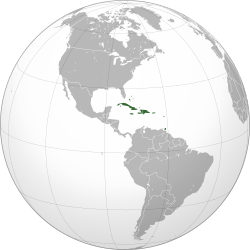Kàríbẹ́ánì
(Àtúnjúwe láti Caribbean)
Kàríbẹ́ánì[2]
 | |
| Size | An archipelago, 4,020 kilometres (2,500 mi) in length, and up to 257 kilometres (160 mi) wide; region contains more than 7,000 islands, islets, reefs, and cays |
|---|---|
| Population (2000) | 37.5 million[1] |
| Ethnic groups | Africans, Native Americans (Arawak, Caribs, Tainos), Europeans (Spanish, French, English, Portuguese, Dutch), Asian (Chinese, Indian) |
| Demonym | West Indian, Caribbean, American |
| Government | 13 sovereign states; also, 2 overseas departments and 14 dependent territories, tied to the European Union or to the United States |
| Largest cities | Havana Santo Domingo Port-au-Prince Kingston San Juan Port of Spain |
| Internet TLD | Multiple |
| Calling code | Multiple |
| Time Zone | UTC-5 to UTC-4 |



|
Àyọkà yìí tàbí apá rẹ̀ únfẹ́ àtúnṣe sí. Ẹ le fẹ̀ jù báyìí lọ tàbí kí ẹ ṣàtúnṣe rẹ̀ lọ́nà tí yíò mu kúnrẹ́rẹ́. Ẹ ran Wikipedia lọ́wọ́ láti fẹ̀ẹ́ jù báyìí lọ. |
Itokasi
àtúnṣe- ↑ Àṣìṣe ìtọ́kasí: Invalid
<ref>tag; no text was provided for refs namedp2000 - ↑ Pronounced /ˌkærɨˈbiːən/ or /kəˈrɪbiən/. Both pronunciations are equally valid; indeed, they see equal use even within areas of the Caribbean itself. Cf. Royal Caribbean, which stresses the second syllable, and Pirates of the Caribbean, which stresses the first and third. In each case, as a proper noun, those who would normally pronounce it a different way may use the pronunciation associated with the noun when referring to it. More generic nouns such as the Caribbean Community are generally referred to using the speaker's preferred pronunciation.
Spánì: [Caribe] error: {{lang}}: text has italic markup (help); Dutch Caraïben (ìrànwọ́·ìkéde); Faransé: Caraïbe or more commonly Antilles